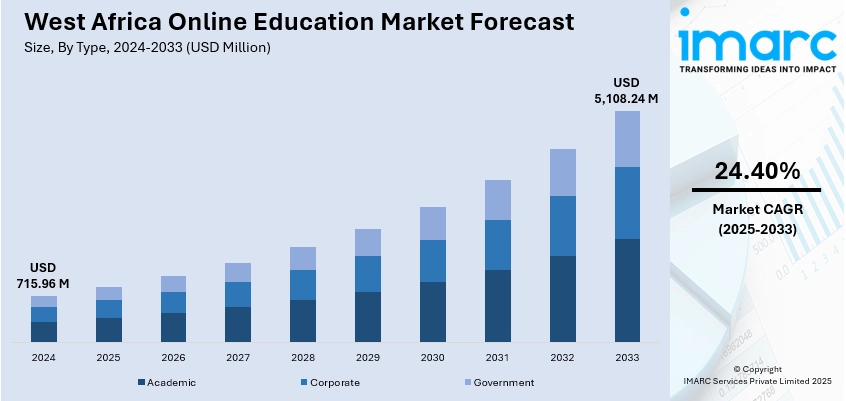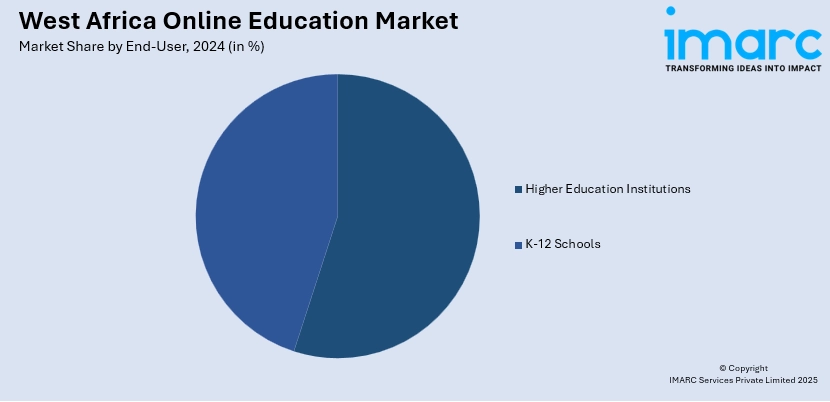
West Africa Online Education Market Size, Share, Trends and Forecast by Type, Provider, Technology, End User, and Country, 2025-2033
West Africa Online Education Market Overview:
The West Africa online education market size reached USD 715.96 Million in 2024. The market is projected to reach USD 5,108.24 Million by 2033, exhibiting a growth rate (CAGR) of 24.40% during 2025-2033. The market is fueled by internet connectivity and mobile penetration, which has ensured that online learning is accessible even in rural areas. Low tuition costs and the ability to learn anytime and anywhere accommodate working professionals and individuals with family obligations. Public programs like Nigeria's "eLearning for All," which seeks to offer free digital courses across the country, further amplify online learning. The young population of the region is also willing to learn new skills, driving demand for online education platforms and increasing West Africa online education market share.
|
Report Attribute
|
Key Statistics
|
|---|---|
|
Base Year
|
2024
|
|
Forecast Years
|
2025-2033
|
|
Historical Years
|
2019-2024
|
| Market Size in 2024 | USD 715.96 Million |
| Market Forecast in 2033 | USD 5,108.24 Million |
| Market Growth Rate 2025-2033 | 24.40% |
West Africa Online Education Market Trends:
Mobile-First Learning Platforms
Mobile-first learning platforms are revolutionizing education in West Africa by taking advantage of the commonality of smartphone use. These learning platforms are developed to be usable even in regions with limited internet connectivity, providing functionalities such as offline access, gamification, and interactive video content. The use of these innovations makes learning flexible and interactive, suitable for learners who do not have regular access to standard desktop computers or high-speed internet. The flexibility of mobile-first solutions is especially valuable in rural areas where infrastructure issues continue to prevail. This development serves to emphasize the need for developing instructional solutions that are both technologically savvy and context-sensitive to the special needs of the region, which further contributes to the West Africa online education market growth.

To get more information on this market, Request Sample
Emergence of Microlearning and Personalized Learning
Microlearning, which presents content in bite-sized, narrow topics, is becoming increasingly popular in West Africa because it caters to the hectic pace of life of most learners. This methodology enables individuals to learn new skills or knowledge in short but regular intervals, making learning more accessible and less time-consuming. Furthermore, there is an increasing focus on individualized learning experiences, wherein learning content is customized to students' individual needs and learning abilities. Such personalization increases interest and effectiveness, providing learners with the support required to succeed. These trends are indicative of a paradigm shift toward more learner-focused models of education that value flexibility and responsiveness.
Government and Institutional Backing for Digital Learning
Governments and institutions in West Africa are increasingly seeing the potential in digital learning and investing in its development. Some of the initiatives involve the establishment of digital infrastructure, such as enhancing internet connectivity and offering access to digital devices, to support online learning. In addition, alliances with foreign institutions and private companies are being developed to raise the standard and accessibility of online learning. These collaborations seek to close the gap in education, particularly in underprivileged communities, and make it possible for more people to take advantage of online learning. These are important assistance to guarantee the sustainable development and success of the online education industry in the region.
West Africa Online Education Market Segmentation:
IMARC Group provides an analysis of the key trends in each segment of the market, along with forecasts at the regional and country levels for 2025-2033. Our report has categorized the market based on type, provider, technology, and end user.
Type Insights:
- Academic
- Higher Education
- Vocational Training
- K-12 Education
- Corporate
- Large Enterprises
- SMBs
- Government
The report has provided a detailed breakup and analysis of the market based on the type. This includes academic (higher education, vocational training, and K-12 education), corporate (large enterprises and SMBs), and government.
Provider Insights:
- Content
- Services
A detailed breakup and analysis of the market based on the provider has also been provided in the report. This includes content and services.
Technology Insights:
- Mobile E-Learning
- Rapid E-Learning
- Virtual Classroom
- Others
A detailed breakup and analysis of the market based on technology has also been provided in the report. This includes mobile e-learning, rapid e-learning, virtual classroom, and others.
End-User Insights:

- Higher Education Institutions
- K-12 Schools
The report has provided a detailed breakup and analysis of the market based on the end-user. This includes higher education institutions and K-12 schools.
Country Insights:
- Nigeria
- Ghana
- Cote de Ivorie
- Cameroon
- Senegal
- Others
The report has also provided a comprehensive analysis of all the major country markets, which include Nigeria, Ghana, Cote de Ivorie, Cameroon, Senegal, and others.
Competitive Landscape:
The market research report has also provided a comprehensive analysis of the competitive landscape. Competitive analysis such as market structure, key player positioning, top winning strategies, competitive dashboard, and company evaluation quadrant has been covered in the report. Also, detailed profiles of all major companies have been provided.
West Africa Online Education Market News:
- In June 2024, uLesson Education, Nigeria's leading edtech firm, introduced an AI-driven homework assistance feature. This occurred to deliver a more effective and outstanding solution to the numerous learners on the uLesson app. This thrilling advancement showcases uLesson's commitment to providing high-quality education to learners across Nigeria and Africa. The former homework assistance feature, dependent on manual entry, did not possess the scalability necessary to address the varied and increasing demands of students on the uLesson app. To tackle this, uLesson has made a major move to incorporate OpenAI’s newest innovation, Chat GPT-4o.
- In April 2025, Daba Finance unveiled Daba Academy—marketed in French as L’École du Patrimoine a thorough online platform aimed at making investment education accessible across Francophone Africa. The initiative aims at retail investors in the WAEMU area seeking to accumulate wealth via the BRVM, the stock exchange for the region.
West Africa Online Education Market Report Coverage:
| Report Features | Details |
|---|---|
| Base Year of the Analysis | 2024 |
| Historical Period | 2019-2024 |
| Forecast Period | 2025-2033 |
| Units | Million USD |
| Scope of the Report |
Exploration of Historical Trends and Market Outlook, Industry Catalysts and Challenges, Segment-Wise Historical and Future Market Assessment:
|
| Types Covered |
|
| Providers Covered | Content, Services |
| Technologies Covered | Mobile E-Learning, Rapid E-Learning, Virtual Classroom, Others |
| End-Users Covered | Higher Education Institutions, K-12 Schools |
| Countries Covered | Nigeria, Ghana, Cote de Ivorie, Cameroon, Senegal, Others |
| Customization Scope | 10% Free Customization |
| Post-Sale Analyst Support | 10-12 Weeks |
| Delivery Format | PDF and Excel through Email (We can also provide the editable version of the report in PPT/Word format on special request) |
Key Questions Answered in This Report:
- How has the West Africa online education market performed so far and how will it perform in the coming years?
- What is the breakup of the West Africa online education market on the basis of type?
- What is the breakup of the West Africa online education market on the basis of provider?
- What is the breakup of the West Africa online education market on the basis of technology?
- What is the breakup of the West Africa online education market on the basis of end-user?
- What is the breakup of the West Africa online education market on the basis of country?
- What are the various stages in the value chain of the West Africa online education market?
- What are the key driving factors and challenges in the West Africa online education market?
- What is the structure of the West Africa online education market and who are the key players?
- What is the degree of competition in the West Africa online education market?
Key Benefits for Stakeholders:
- IMARC’s industry report offers a comprehensive quantitative analysis of various market segments, historical and current market trends, market forecasts, and dynamics of the West Africa online education market from 2019-2033.
- The research report provides the latest information on the market drivers, challenges, and opportunities in the West Africa online education market.
- Porter's five forces analysis assist stakeholders in assessing the impact of new entrants, competitive rivalry, supplier power, buyer power, and the threat of substitution. It helps stakeholders to analyze the level of competition within the West Africa online education industry and its attractiveness.
- Competitive landscape allows stakeholders to understand their competitive environment and provides an insight into the current positions of key players in the market.
Need more help?
- Speak to our experienced analysts for insights on the current market scenarios.
- Include additional segments and countries to customize the report as per your requirement.
- Gain an unparalleled competitive advantage in your domain by understanding how to utilize the report and positively impacting your operations and revenue.
- For further assistance, please connect with our analysts.
 Request Customization
Request Customization
 Speak to an Analyst
Speak to an Analyst
 Request Brochure
Request Brochure
 Inquire Before Buying
Inquire Before Buying




.webp)




.webp)












